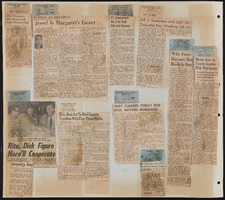Search the Special Collections and Archives Portal
Search Results

Della Coates interview, March 18, 1978: transcript
Date
1978-03-18
Archival Collection
Description
On March 18, 1978, collector Bill Hitchcock interviewed Della Coates (b. June 17th, 1919 in Birmingham, Alabama) at her home in Las Vegas, Nevada. In the interview, Della Coates discusses her time working for the telephone company. She also speaks about the changes in education and about changes throughout Las Vegas.
Text
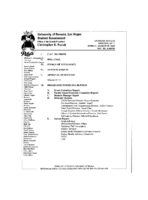
Meeting minutes for Consolidated Student Senate, University of Nevada, Las Vegas, March 28, 2003
Date
2003-03-28
Archival Collection
Description
Includes meeting minutes and agenda. CSUN Session 33 (Part 1) Meeting Minutes and Agendas.
Text

Meeting minutes for Consolidated Student Senate University of Nevada, Las Vegas, October 17, 1985
Date
1985-10-17
Archival Collection
Description
Includes meeting agenda and minutes. CSUN Session 15 Meeting Minutes and Agendas.
Text
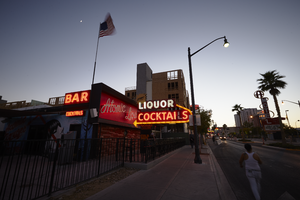
Photographs of Atomic Liquors at dusk, Las Vegas (Nev.), June 28, 2017
Date
2017-06-28
2017-08-12
Archival Collection
Description
The Atomic Liquors bar sits at 927 Fremont Street in Downtown Las Vegas. Information about the sign is available in the Southern Nevada Neon Survey Sheet.
Site address: 927 Fremont St
Sign owner: 100 10th Street LLC
Sign details: Property sold by Lance Johns to 100 10th Street LLC in 2014 for $3,480,000. Recent addition to property in 2017 (927 Fremont Street).
Sign condition: 3 - Decent: neon in great condition, paint chipping off and some bulbs not repaired
Sign form: Directional Monument sign, back to back "Double sided"
Sign-specific description: Uses directional tool of an arrow, has chasing animation in the arrow with incandescent bulbs. It has blade like additions to it for the word "Liquor" and "Cocktails", each word on its own blade which are parallel to the ground, they are painted red. The word "Atomic" sits on the top in a comic style "blast" shaped bubble painted yellow. "Packaged liquors" and "Cold beer" painted on the base structure of the sign. Bulbs glow yellow, "Liquor" glows blue, "Cocktails" glows red, "Atomic" is not lit.
Sign - type of display: Neon and incandescent
Sign - media: Steel
Sign animation: Chaser effect with bulbs
Sign environment: Property surrounded by other bars/clubs and motels.
Sign - date of installation: c. 1952
Sign - artistic significance: 1950s atomic testing theme - popular due to test sight 65 miles north of city
Survey - research locations: Bar website, www.roadarch.com, owner
Surveyor: Danny Jacobs
Survey - date completed: 2017-08-12
Sign keywords: Neon; Incandescent; Steel; Chasing; Directional; Monument sign; Back to back; Fascia; Floating Mount Letters
Site address: 927 Fremont St
Sign owner: 100 10th Street LLC
Sign details: Property sold by Lance Johns to 100 10th Street LLC in 2014 for $3,480,000. Recent addition to property in 2017 (927 Fremont Street).
Sign condition: 3 - Decent: neon in great condition, paint chipping off and some bulbs not repaired
Sign form: Directional Monument sign, back to back "Double sided"
Sign-specific description: Uses directional tool of an arrow, has chasing animation in the arrow with incandescent bulbs. It has blade like additions to it for the word "Liquor" and "Cocktails", each word on its own blade which are parallel to the ground, they are painted red. The word "Atomic" sits on the top in a comic style "blast" shaped bubble painted yellow. "Packaged liquors" and "Cold beer" painted on the base structure of the sign. Bulbs glow yellow, "Liquor" glows blue, "Cocktails" glows red, "Atomic" is not lit.
Sign - type of display: Neon and incandescent
Sign - media: Steel
Sign animation: Chaser effect with bulbs
Sign environment: Property surrounded by other bars/clubs and motels.
Sign - date of installation: c. 1952
Sign - artistic significance: 1950s atomic testing theme - popular due to test sight 65 miles north of city
Survey - research locations: Bar website, www.roadarch.com, owner
Surveyor: Danny Jacobs
Survey - date completed: 2017-08-12
Sign keywords: Neon; Incandescent; Steel; Chasing; Directional; Monument sign; Back to back; Fascia; Floating Mount Letters
Mixed Content
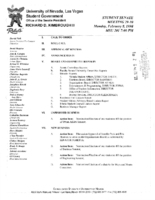
Meeting minutes for Consolidated Student Senate University of Nevada, Las Vegas, February 8, 1999
Date
1999-02-08
Archival Collection
Description
Includes meeting agenda and minutes, along with additional information about bylaws and bills. CSUN Session 29 Meeting Minutes and Agendas.
Text
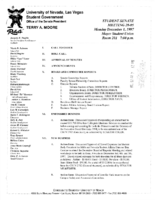
Meeting minutes for Consolidated Student Senate University of Nevada, Las Vegas, December 1, 1997
Date
1997-12-01
Archival Collection
Description
Includes meeting agenda and minutes. CSUN Session 28 Meeting Minutes and Agendas.
Text
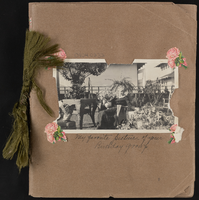
Helen J. Stewart birthday scrapbook
Date
1924
Archival Collection
Description
Helen J. Stewart birthday scrapbook
Mixed Content
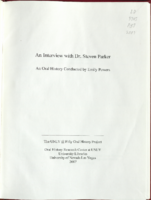
Transcript of interview with Dr. Steven Parker by Emily Powers, December 19, 2006
Date
2006-12-19
Archival Collection
Description
Dr. Steven Parker grew up and went to school in Connecticut. His parents were caterers and taught him a solid work ethic through example. His only sibling was finishing a post doctorate at Yale and had accepted a job at one of the Cal State schools when his life was tragically ended. Steven graduated from Assumption College in Massachusetts with a bachelor's in political science and got a scholarship to State University of New York at Albany. About hallway through his Master of Public Administration degree, the dean encouraged him to go on for his doctorate. He finished his PhD in 1971, and got a job at Western Illinois University which he started on September 15, 1971, the same day his son was born. Alter 8 years (and another child) in Illinois, Steve and his wife were ready to leave. He had attended a public administration conference in Baltimore in the spring of 1975, and was interviewed by Dina Titus and Tom Wright of UNLV. He had several other job offers, but UNLV looked like the best possibility, so he and his family moved to Las Vegas. Dr. Parker's title at UNLV was associate professor and department chair, although Dina Titus actually chaired the department his first semester here. He took over as chair in the spring of 1980. Steven started when Brock Dixon was interim chair, and has served under university presidents Leonard "Pat" Goodall, Bob Maxson, and Carol Harter. Today Dr. Parker teaches American Presidency and American government every semester, Natural Resource Policy and Political Corruption and Political Ethics once or twice a year, and occasionally teaches Urban Government. He also continues as the director of the University Forum Lecture Series, which was initiated by Tom Wright more than 23 years ago.
Text
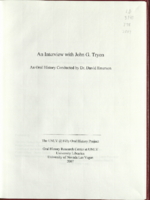
Transcript of interview with John G. Tryon by Dr. David Emerson, February 21, 2006
Date
2006-02-21
Archival Collection
Description
John G. Tryon was one of the early leading figures in the Engineering Department at UNLV. He grew up in Washington, D.C., the oldest of three sons. His father worked with the National Bituminous Coal Commission during the Depression and his mother was editor of the American Association of University Women's Publications. John went directly to University of Minnesota after high school graduation and earned a bachelor's in physics. During WWII he served in the Army Signal Corps and then went back to Cornell University to get his doctorate. His post doctoral work experience includes six years at Bell Telephone Laboratories, eleven years at University of Alaska, and six years at Tuskegee Institute. In 1974, Dr. Tryon interviewed at UNLV and was hired. The faculty carefully built up the curriculum, adding classes one at a time. John introduced a senior engineering design course modeled after one that pioneered at Dartmouth. He had also introduced this particular course at University of Alaska and Tuskegee. John was a member of the Academic Standards Committee at UNLV which helped set standards for academic probation and semester length. He has strong opinions on keeping engineering students who show promise and interest, and letting go of students whose academic strengths don't match the program. He believes students need to be matched to opportunity, be given the chance to find a niche that fits, and that they should not be given inflated grades or false hope. Dr. Tryon met his wife-to-be in Ithaca, New York, while attending Cornell University. His wife's mother, who was married to a botany professor, had invited him to Sunday dinner, something she had done for a number of students. John and his wife, who eventually became an English teacher, have two sons who grew to college age while they were in Alaska. Today they enjoy their church community, their family, and their circle of friends.
Text
Pagination
Refine my results
Content Type
Creator or Contributor
Subject
Archival Collection
Digital Project
Resource Type
Year
Material Type
Place
Language
Records Classification

